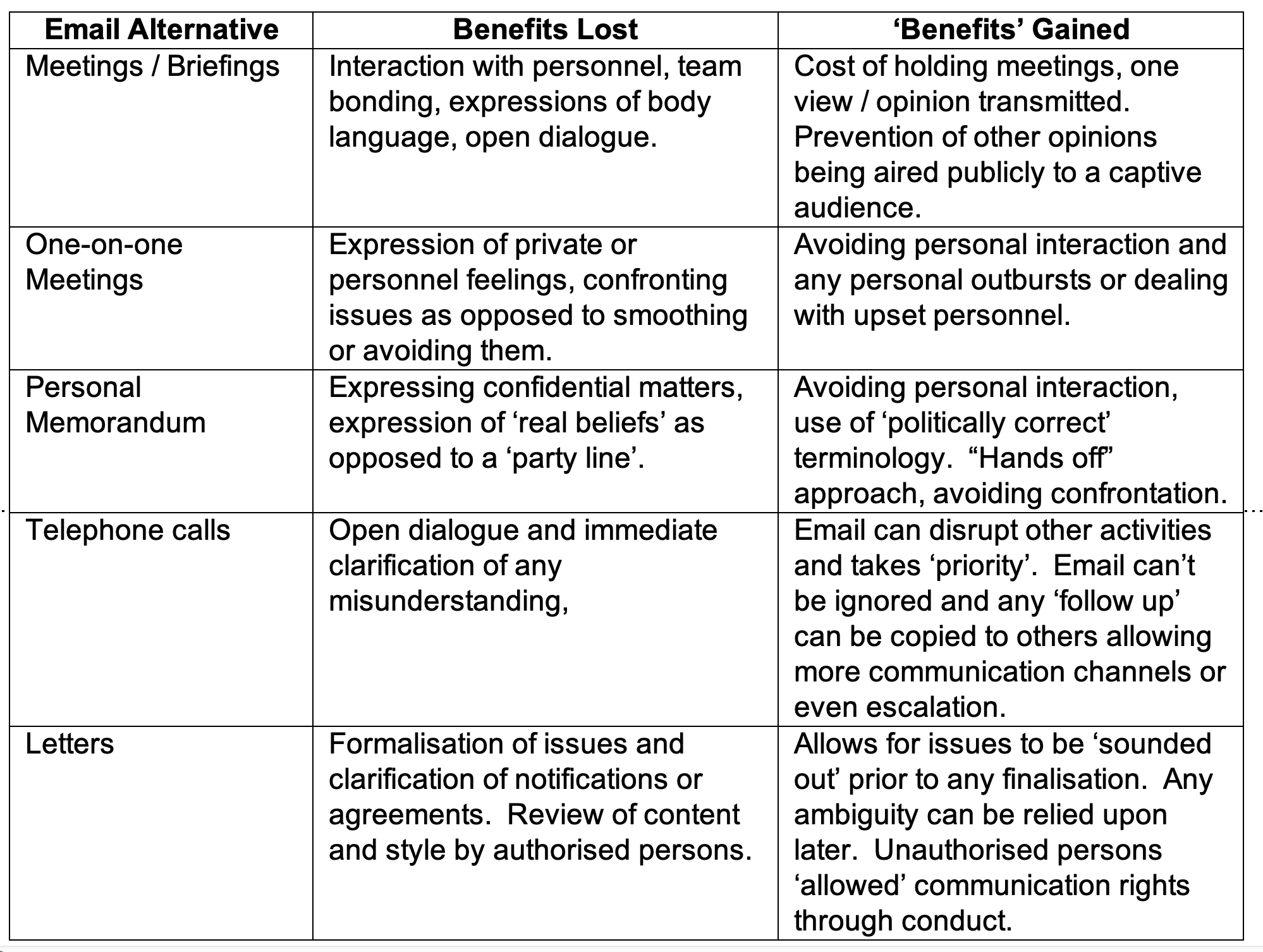 Economics concerns itself with the determination of the most logical and effective use of resources to meet private and social goals for some form of benefit. While primarily concerned with industry and business, its concepts of opportunity cost, supply and demand, present value, and mutual interdependence economics is also applicable to email; one of our most utilised forms of communication but, possibly, the most hated.
Economics concerns itself with the determination of the most logical and effective use of resources to meet private and social goals for some form of benefit. While primarily concerned with industry and business, its concepts of opportunity cost, supply and demand, present value, and mutual interdependence economics is also applicable to email; one of our most utilised forms of communication but, possibly, the most hated.
From its rudimentary beginnings in 1972, and despite an announcement in 2007 that email was dead and similar pronouncements by agencies such as WSJ and Forbes, email thrives. It’s essential to businesses and this year, 2022, it’s anticipated that humans (and machines) will send 126.7 trillion emails, that’s ~15,800 per person. For some humans, email is their raison d’etre so they may demonstrate their importance by how often they are cc’d or to whom they forward messages. For others their perpetually full inbox, a permanent millstone round their neck, can be a symbol of futility and hopelessness as responses are demanded in time frames that can’t be supplied.
How often do we receive an email that’s also sent to a multitude of others? How often do we question whether to respond, not respond, or even to take notice? And how often do we question whether the email has any relevance to us, or even others. Emails, like talk can be cheap. When things are cheap they have little value which is of little or no benefit…and that’s simple economics.
Opportunity Cost
Opportunity cost, economically, is the cost of a decision measured by the next best alternative given up or, in other terms, the benefits you lose by choosing one alternative over another one. From a communications perspective this “best alternative” is taken to be an email above other media such as a letter, memorandum, ‘phone call, or even a meeting.
Email can be an extremely efficient way of communicating, indeed as an opportunity in today’s marketing it’s almost indispensable. It’s cheap, quick, simple, almost instantaneously accessible (or retrievable), paperless, and allows for mass sending thereby keeping everybody ‘in the loop’. For many, and possibly most importantly, it’s ‘in writing’ and provides for future evidence if things go wrong. However, its effectiveness compared with other media can be questionable as summarised below:
Emails, despite being pushed to us are often disregarded. If they are unclear or poorly drafted and require clarifications, or are issued to al and sundry they may be ignored. Alternatives are available but even though the supply of emails is never-ending, for many of us, the demand is not reciprocated.
Supply & Demand
In economics the price, or value of something is determined by supply and demand. This price, the equilibrium price, is the value at which the quantity that consumers want to purchase equals the quantity that suppliers want to sell. This applies to many types of communication such as books, cable TV, newspapers, but with email there’s a twist.
An email itself has little, if any, intrinsic value. The content of an email to a ‘consumer’ may have value, there will have been some costs associated with its supply, and value may be attached to any response. Emails can be forwarded to a consumer who may receive the same email multiple times, even without the original supplier’s knowledge or even consent, supply can certainly exceed demand for some. Oversupply can also cut chains of command as well as spans of control and overload can cause confusion.
Emails can be akin to ‘chatting’ and as the idiom goes “Talk is cheap” because it’s easier to talk about doing something than doing it. Economically speaking it’s because “supply exceeds demand”. Pragmatically speaking there are more emails than we need.
We use email to obtain or share information. It’s also used to put forward opinions, involve multiple parties through multiple copies, escalate matters of importance to the sender and, in corporate rat races, cover one’s rear as well. These tend to diminish the value of emails, but their value lies when used for legitimate or professional reasons.
Present Value
From a monetary standpoint a dollar today is worth more than a dollar in the future. When it comes to email, and when used to transmit information for making decisions, the timely issue and receipt is essential for decision making. Late decisions, or an absence of optimal information can mean the difference between success or failure, profit or loss.
Emails can take time to send, time for assimilation or interpretation, and possibly time for clarification prior to responding. As a means of garnering opinions email can be extremely effective but only if time constraints are imposed and respected. Late information will miss deadlines so decisions will be suboptimal due to incomplete data and, just as future money has a lower value, so do late emails.
But the value of an email for some can be historical. Sending a ‘late’ email may be understood as being late, but it gives the opportunity for some proponents to say, ‘I told you so’. Emails are records so, if problems arise, they may be used in any subsequent witch-hunt to either preserve or ruin reputations. Although an almost instantaneous form of communication this is only in transmission. A late email may miss the present, but for some its real value and benefit may well be in the future if history is investigated.
Mutual Interdependence
Mutual interdependence exists between parties because a change in one party’s strategy will affect the way in which the other behaves. Economically this is the affect of a change in one firm’s pricing strategy on the sales and profits of others. Email communication, outside of mass marketing and mailing lists, is, for the most part, a two-way street and the parties react to communications accordingly.
Incentives are part of such interdependence and the issuing of and response to emails are no exception. Some people thrive on issuing emails. They express personal opinions or ask for them, they let people know what’s ‘going on’, escalate matters as they see fit, and are seen to be ‘being busy’. However, for effective communication some feedback is required so any would-be respondent needs to be incentivized to provide the same. This may be fulfilling a duty of a job description, being seen to be involved, or to seek recognition. For some it’s an act of self-preservation to avoid a reprimand or admonishment, but it may also be for their job satisfaction.
But for some, they choose not to reply. Emails rarely get lost in the post and, although some may end up as ‘junk’ why don’t people reply? If mutual interdependence isn’t recognised, then all too often there can be unintended consequences. Badly crafted emails, failing to convey a precise message and make it clear that a reply is required, or requiring a recipient to read reams of trailing mails, while giving a complete history, can deter a reply. The inclusion of multiple recipients is also a deterrent.
Another unintended consequence of emails is the ease at which they may be forwarded to others. Recipients can easily include others. ‘Many hands make light work’ but ‘too many cooks spoil the broth’ and the supply of emails can quickly exceed any legitimate demand. The possibility of a responses with real value diminishes. With increasing numbers of communication channels, we will experience diminishing returns and the probability of responses with value is inversely proportional to the number of recipients.
Conclusions
Studies show that tens of billions of dollars are lost annually because of poor communications. These losses affect national economies as well as businesses and are manifested in slowdowns, project delays, and lost opportunities due to poor or late decisions and disputes. Email is a contributory factor.
Email can be a boon, but its misuse can easily reduce the value of communication. It can disincentivise those whose mailbox is perpetually full, overload others who are unable to respond, and create communication channels that are not needed.
Email, like talk, appears cheap, but if there’s a dispute, its only cheap until you hire your lawyer…so make sure your email is the economically viable communication opportunity.
Bio:
Malcolm Peart is an UK Chartered Engineer & Chartered Geologist with over thirty-five years’ international experience in multicultural environments on large multidisciplinary infrastructure projects including rail, metro, hydro, airports, tunnels, roads and bridges. Skills include project management, contract administration & procurement, and design & construction management skills as Client, Consultant, and Contractor.
